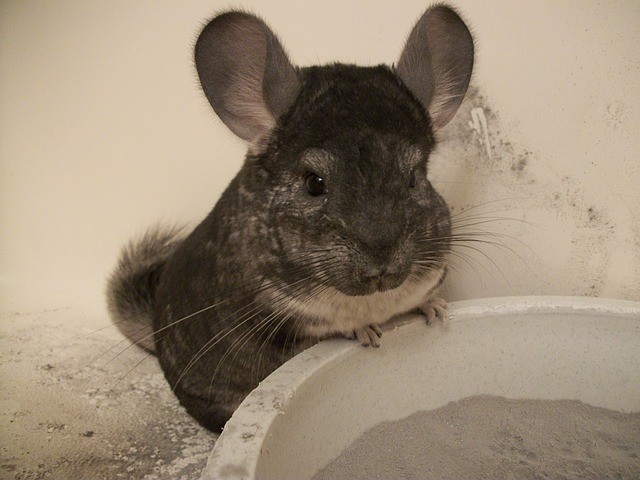
Before adopting a pet, it is important to know their sleep habits.
If you are considering adopting a chinchilla, you should know that they don’t follow our sleep-wake cycle. So does that mean they are nocturnal?
Technically chinchillas are crepuscular, not nocturnal.
But hold on, what exactly does crepuscular mean? And what does this mean for someone who is considering adopting a chinchilla?
Don’t worry, we are going to dive into all of this together. By the end of this post, you will understand the sleep schedule of chinchillas. This will help you make an informed decision about adopting one of these adorable crepuscular creatures.
What Does Crepuscular Mean?
So we now know that chinchillas are crepuscular, not nocturnal. But what exactly does this mean?
Crepuscular animals are most active during twilight hours (dawn and dusk). Instead of only sleeping during the day or the night, they sleep during parts of the day and the night.
Animals developed crepuscular habits for a variety of reasons. These instincts are most likely linked to hunting. Wild chinchillas are considered prey, not predators. So they had to develop a sleep-wake cycle that best helped them avoid predators.
Also, chinchillas can overheated easily. So it makes sense that they are active during the darker, cooler parts of the day. In the wild, chinchillas find a dark space to sleep during the hot, sunny afternoons.
Domesticated cats, bats, moose, deer, and hamsters are also considered crepuscular creatures. This term is slightly misleading. Crepuscular creatures are not only active during dawn and dusk. Moonlit nights and overcast days can also cause crepuscular animals to become active. But in general, crepuscular creatures are classified as being most active during dawn and dusk.
What is the Difference Between Crepuscular, Nocturnal, and Diurnal?
Before we go any further, let’s look at three essential terms:
- Crepuscular creatures
- Nocturnal creatures
- Diurnal creatures
Crepuscular creatures, as we’ve discussed, are active during dawn and dusk. Many crepuscular animals are mistaken for nocturnal animals. But crepuscular animals are active during the twilight hours. Their schedules developed for a variety of reasons. Most likely, their schedules were adapted to help them feed (or avoid being eaten). Chinchillas probably developed a crepuscular schedule to avoid predators. Also, they needed to keep cool, so they adapted to be active during the cooler parts of the day and night. Skunks, domesticated cats, and hamsters are also crepuscular.
Nocturnal animals are active at night and sleep during the day. These animals have adapted to the darkness. Many nocturnal animals have large eyes that allow more light to enter, helping them see in low-light. They often have heightened senses, including smell and hearing, so they can hunt in the dark. Tigers, owls, and beavers are nocturnal animals.
Diurnal animals are active during the day and sleep at night. Does that sound like you? Yes, humans are diurnal. But for a variety of social and cultural reasons, humans can adapt to a nocturnal schedule. Songbirds and squirrels are more strict diurnal creatures. They always sleep during the night and stay active during the day. And although humans can adapt to a nocturnal schedule, you should not try to adjust your chinchilla’s schedule. These creatures can become ill if their sleep-schedule is altered.
Can I Transition my Chinchilla to a Diurnal Schedule?
As we’ve learned, chinchillas are crepuscular animals. But they are typically very active at night, which makes some people mistake them as nocturnal creatures.
When chinchillas are awake, they are often very active. They like to run, jump, eat, chew, and play. And they can make a lot of noise during these activities. Their active nights can be very disturbing for us diurnal creatures.
So, can you help your chinchilla adopt a diurnal schedule?
Unfortunately, no.
Chinchilla’s follow an instinctual crepuscular schedule. And it is very difficult and unhealthy for them to adopt a different schedule. So if you plan to adopt a chinchilla, you need to be prepared for their crepuscular schedule.
What Should a Chinchilla Cage Include?
Now we know that chinchillas are crepuscular. But what else do you need to know about their sleeping habits? Essentially, you just need to know how to create an environment that helps your chinchilla feel comfortable enough to sleep.
As a chinchilla owner, it is important to create a safe and comfortable cage for your chinchilla. This will help them sleep better and stay entertained during their active hours.
Also, you should not (unless you have to) keep their cage in your bedroom. Since they are active at dusk and night, they might keep you up while you are trying to sleep. To avoid this, keep their cage in another area of your house. That way, they can make all the noise they want without disturbing your sleep.
In the wild, chinchillas like to sleep in enclosed, dark spaces. So, offer a similar structure in their cage. Consider placing a hollow log, a small tunnel, or a bridge in their cage. They will likely choose to sleep in this enclosed, dark space.
Additionally, make sure your chinchilla has access to toys (including chew toys) and a wheel. These will keep your chinchilla entertained during their active hours.
Of course, their cage should also include a water bottle, food, and some type of absorptive lining.
Final Thoughts
So, contrary to popular belief, chinchillas are not nocturnal.
Yes, they are often active at night. And this behavior can be frustrating, especially if their cage is close to your bedroom. But in reality, chinchillas are crepuscular creatures. They are most active during the twilight hours.
Make sure to consider this before adopting a chinchilla. You need to be prepared for a pet that is only active in the early morning and late evening. But, if this schedule doesn’t bother you, chinchillas can make great pets. They are affectionate, adorable, and robust creatures.
Before reading this article, did you know that chinchillas are crepuscular? Let us know!
